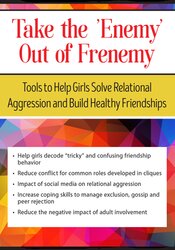

Helping girls learn how to navigate friendships can be rewarding, but also time-consuming and emotionally exhausting for the clinician. The school environment is the most common arena for relational aggression to develop. Something as simple as choosing partners for a project, finding a seat on the bus or lunchroom, or playing at recess can erupt in drama. Pile on parent involvement and social media and situations can exponentially escalate.
Signs of relational aggression can manifest in several ways: increased conflict, social isolation, poor grades, decreased concentration, physical complaints of nausea, headaches, changes in weight, digestive problems, and sleep disturbance. Symptoms can develop into depression, anxiety, self-harm, and eating disorders.
Watch this recording and you’ll learn:
You’ll receive reproducible handouts, scripts and prompts, step-by-step intervention instructions, and examples of parent coaching sessions and will be equipped to teach girls the skills to manage conflict and form healthy bonds, thereby improving their mental health!
| File type | File name | Number of pages | |
|---|---|---|---|
| Manual - Take the ‘Enemy’ Out of Frenemy (6.1 MB) | 60 Pages | Available after Purchase | |
| Manual - Take the ‘Enemy’ Out of Frenemy - French (6.1 MB) | 60 Pages | Available after Purchase | |
| Manual - Take the ‘Enemy’ Out of Frenemy - Italian (6.1 MB) | 60 Pages | Available after Purchase |

Susan Fee, M.Ed., NCC, LMHC, is a national speaker and author in private practice. She developed Circle of F.R.I.E.N.D.S., a curriculum and facilitator’s guide, to teach girls ages 8-14 how to build healthy friendships through assertive communication, conflict resolution, and resiliency. Susan has provided training on relational aggression for students, educational faculty, parents, and mental health professionals for the last 15 years, including 10 years speaking at the American Camp Association conference.
In 2016, she delivered a TEDxWWU talk on relational aggression. Susan is passionate about the use of storytelling in mental health and is the director of “The Brainchronicles,” a storytelling show for NAMI of Washington State. She’s a regular Seattle MOTH StorySLAM winner and has been featured on The Moth Radio Hour. Susan is a member of the American Counseling Association and board member of Washington Mental Health Counselor Association.
Speaker Disclosures:
Financial: Susan Fee maintains a private practice and receives compensation as a presenter. She receives a speaking honorarium and recording royalties from PESI, Inc. She has no relevant financial relationships with ineligible organizations.
Non-financial: Susan Fee has no relevant non-financial relationships.
Interpreting Overt and Covert Behaviours
Cliques and Group Dynamics
Coping Strategies for Relational Aggression
Parent/Family Support for Girls
Please wait ...